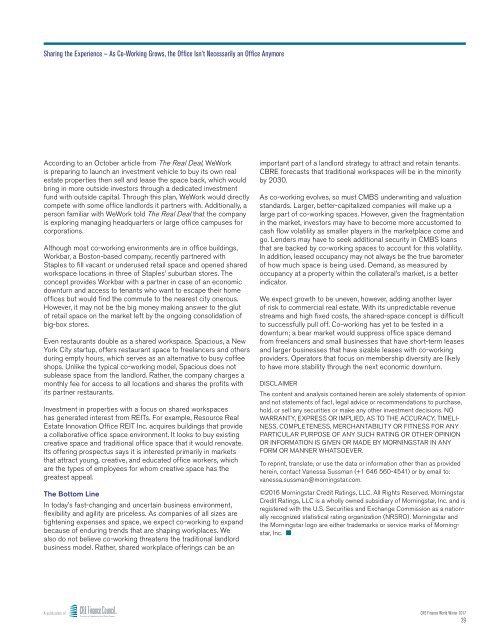CRE FinanCE W Rld
CREFW-Winter2017
CREFW-Winter2017
Create successful ePaper yourself
Turn your PDF publications into a flip-book with our unique Google optimized e-Paper software.
Sharing the Experience — As Co-Working Grows, the Office Isn’t Necessarily an Office Anymore<br />
According to an October article from The Real Deal, WeWork<br />
is preparing to launch an investment vehicle to buy its own real<br />
estate properties then sell and lease the space back, which would<br />
bring in more outside investors through a dedicated investment<br />
fund with outside capital. Through this plan, WeWork would directly<br />
compete with some office landlords it partners with. Additionally, a<br />
person familiar with WeWork told The Real Deal that the company<br />
is exploring managing headquarters or large office campuses for<br />
corporations.<br />
Although most co-working environments are in office buildings,<br />
Workbar, a Boston-based company, recently partnered with<br />
Staples to fill vacant or underused retail space and opened shared<br />
workspace locations in three of Staples’ suburban stores. The<br />
concept provides Workbar with a partner in case of an economic<br />
downturn and access to tenants who want to escape their home<br />
offices but would find the commute to the nearest city onerous.<br />
However, it may not be the big money making answer to the glut<br />
of retail space on the market left by the ongoing consolidation of<br />
big-box stores.<br />
Even restaurants double as a shared workspace. Spacious, a New<br />
York City startup, offers restaurant space to freelancers and others<br />
during empty hours, which serves as an alternative to busy coffee<br />
shops. Unlike the typical co-working model, Spacious does not<br />
sublease space from the landlord. Rather, the company charges a<br />
monthly fee for access to all locations and shares the profits with<br />
its partner restaurants.<br />
Investment in properties with a focus on shared workspaces<br />
has generated interest from REITs. For example, Resource Real<br />
Estate Innovation Office REIT Inc. acquires buildings that provide<br />
a collaborative office space environment. It looks to buy existing<br />
creative space and traditional office space that it would renovate.<br />
Its offering prospectus says it is interested primarily in markets<br />
that attract young, creative, and educated office workers, which<br />
are the types of employees for whom creative space has the<br />
greatest appeal.<br />
The Bottom Line<br />
In today’s fast-changing and uncertain business environment,<br />
flexibility and agility are priceless. As companies of all sizes are<br />
tightening expenses and space, we expect co-working to expand<br />
because of enduring trends that are shaping workplaces. We<br />
also do not believe co-working threatens the traditional landlord<br />
business model. Rather, shared workplace offerings can be an<br />
important part of a landlord strategy to attract and retain tenants.<br />
CBRE forecasts that traditional workspaces will be in the minority<br />
by 2030.<br />
As co-working evolves, so must CMBS underwriting and valuation<br />
standards. Larger, better-capitalized companies will make up a<br />
large part of co-working spaces. However, given the fragmentation<br />
in the market, investors may have to become more accustomed to<br />
cash flow volatility as smaller players in the marketplace come and<br />
go. Lenders may have to seek additional security in CMBS loans<br />
that are backed by co-working spaces to account for this volatility.<br />
In addition, leased occupancy may not always be the true barometer<br />
of how much space is being used. Demand, as measured by<br />
occupancy at a property within the collateral’s market, is a better<br />
indicator.<br />
We expect growth to be uneven, however, adding another layer<br />
of risk to commercial real estate. With its unpredictable revenue<br />
streams and high fixed costs, the shared-space concept is difficult<br />
to successfully pull off. Co-working has yet to be tested in a<br />
downturn; a bear market would suppress office space demand<br />
from freelancers and small businesses that have short-term leases<br />
and larger businesses that have sizable leases with co-working<br />
providers. Operators that focus on membership diversity are likely<br />
to have more stability through the next economic downturn.<br />
DISCLAIMER<br />
The content and analysis contained herein are solely statements of opinion<br />
and not statements of fact, legal advice or recommendations to purchase,<br />
hold, or sell any securities or make any other investment decisions. NO<br />
WARRANTY, EXPRESS OR IMPLIED, AS TO THE ACCURACY, TIMELI-<br />
NESS, COMPLETENESS, MERCHANTABILITY OR FITNESS FOR ANY<br />
PARTICULAR PURPOSE OF ANY SUCH RATING OR OTHER OPINION<br />
OR INFORMATION IS GIVEN OR MADE BY MORNINGSTAR IN ANY<br />
FORM OR MANNER WHATSOEVER.<br />
To reprint, translate, or use the data or information other than as provided<br />
herein, contact Vanessa Sussman (+1 646 560-4541) or by email to:<br />
vanessa.sussman@morningstar.com.<br />
©2016 Morningstar Credit Ratings, LLC. All Rights Reserved. Morningstar<br />
Credit Ratings, LLC is a wholly owned subsidiary of Morningstar, Inc. and is<br />
registered with the U.S. Securities and Exchange Commission as a nationally<br />
recognized statistical rating organization (NRSRO). Morningstar and<br />
the Morningstar logo are either trademarks or service marks of Morningstar,<br />
Inc.<br />
A publication of <strong>CRE</strong> Finance World Winter 2017<br />
29


